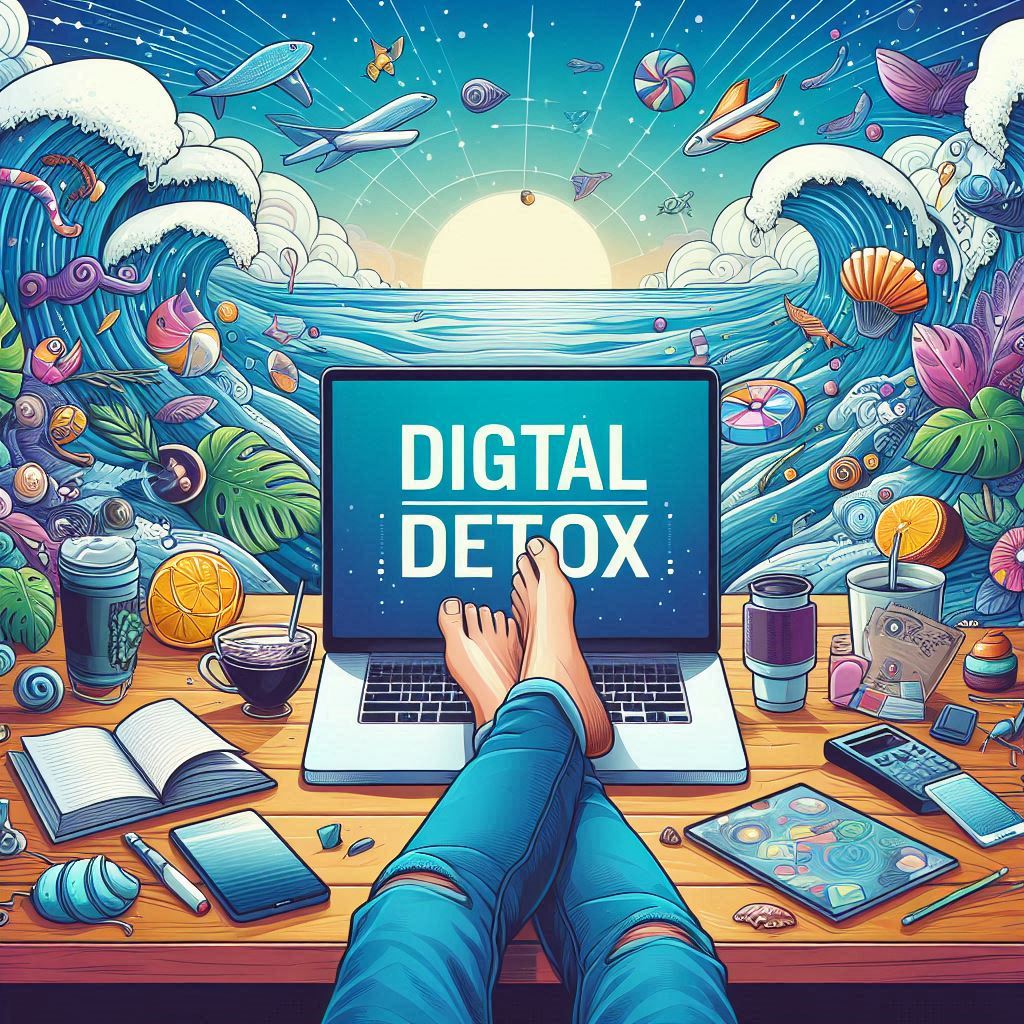Digital Detox: Why Stepping Away from Your Screen Could Be the Best Thing You Do for Your Mental Health

Description :
Feeling tired, anxious, or unfocused? Maybe your mind isn’t the problem—maybe it’s the screen. Here’s a heartfelt guide to logging off and coming back to life.
CHARACTER LEARNING – I didn’t know I was drowning until I tried breathing again.
It started subtly. I’d wake up and reach for my phone before my feet touched the floor. I’d scroll while eating, “check something quickly” in the middle of conversations, and somehow always end my nights staring at a glowing rectangle, even when my eyes begged for rest.
And then one day, I caught myself: I was surrounded by more information than ever before, yet I felt empty. My head buzzed, but my heart was quiet. I was connected to the world—but disconnected from myself.
That’s when I realized: it wasn’t just tiredness. It was digital fatigue.
And maybe, just maybe, logging off was not an escape—but a way back home.
We Live in a Screen-First World
Let’s be honest: screens are everywhere. We use them to work, learn, entertain, communicate, escape, and even to sleep. They’ve become our window to the world—and our shield from it.
But this constant digital connection comes with a cost:
- Anxiety when you haven’t checked your messages
- Guilt for not replying fast enough
- Brain fog from too many tabs open (in your browser and your mind)
- The strange loneliness that comes from being always online, but rarely present
And here’s the kicker: we rarely stop to ask ourselves why.
The Illusion of Connection
Social media promises connection—but often delivers comparison.
We scroll through curated feeds, watching highlight reels of other people’s lives, while comparing them to our own behind-the-scenes. It’s exhausting. And dangerous.
You don’t realize how much mental space it steals until you step away. The likes, the messages, the pressure to “keep up”—it doesn’t leave you room to breathe.
Logging off, even briefly, allows you to return to a deeper kind of connection:
Not “likes,” but laughter.
Not “followers,” but family.
Not “content,” but real conversation.
Signs You Might Need a Digital Detox
You don’t need to wait until you burn out completely. Sometimes, your mind whispers before it screams. Here are some signs that might be worth noticing:
- You check your phone before you even say “Good morning”
- You feel anxious or restless when you’re not online
- You scroll mindlessly but don’t feel fulfilled
- You struggle to focus or feel creatively blocked
- You’re physically present, but mentally elsewhere
If any of these sound familiar, maybe it’s time to pause—not forever, just long enough to remember what life feels like without constant noise.
What Happens When You Log Off
At first, it’s uncomfortable. You’ll instinctively reach for your phone. You’ll worry you’re missing out. Your fingers might twitch for dopamine.
But then, slowly—things shift.
You notice the birds. You listen more deeply. You eat slower. You remember how to be alone without being lonely.
And in that quiet, something precious returns: yourself.
Your thoughts become clearer. Your emotions more grounded. Your creativity begins to stretch its limbs again. It’s like giving your soul a moment to breathe.
How to Start a Simple Digital Detox (Without Going Off-Grid)
You don’t need to disappear into the mountains (though that sounds lovely). A digital detox doesn’t have to be dramatic. It just needs to be intentional.
Here are some gentle, realistic ways to begin:
1. Tech-Free Mornings
Delay phone use for the first 30–60 minutes of your day. Instead, stretch, read, pray, or just breathe.
2. The “One-Screen” Rule
Try not to multitask screens. If you’re watching something, just watch. If you’re reading, just read.
3. Create “No-Phone Zones”
Designate certain spaces (like the dining table or your bed) as screen-free. Protect them.
4. Unfollow to Unclutter
Unfollow accounts that drain you. Follow ones that nourish your mind or take a break entirely.
5. Schedule Digital Sabbaths
Pick one day a week (or even an hour a day) to be fully offline. Let your nervous system rest.
Remember: the goal isn’t to reject technology—but to reclaim balance.
What You Might Find Again
The most beautiful part of a digital detox isn’t what you lose, but what you rediscover:
- The peace of walking without music, just the sound of your breath and the world
- The joy of being truly present with a loved one, eye to eye, heart to heart
- The creativity that returns when your mind isn’t overstimulated
- The clarity that comes when silence isn’t something you fill—but something you enter
You may even realize how much of your worth had quietly become tied to what you posted, who responded, or how many people “liked” you. Logging off helps break that illusion. You are enough—even when no one is watching.
It’s Not About Escape. It’s About Returning.
This isn’t about hating technology. It’s not about shame or guilt. It’s about recalibrating. Coming back to center.
You are not a machine, and your worth is not a productivity report.
You are a living soul—meant to rest, to feel, to breathe, to be.
Logging off isn’t about cutting the world out. It’s about remembering the world within.
Final Thoughts: Presence Is the New Luxury
In a noisy world, presence is a rare treasure. The kind that doesn’t buzz or ping, but simply is.
Maybe we don’t need more information.
Maybe we just need more moments—unfiltered, undistracted, sacred.
So take a break.
Not to disconnect—but to reconnect.
Not to run away—but to come home.
Home to your thoughts, your breath, your real life.
Because sometimes, the most radical thing you can do for your mental health… is to log off.[*]
